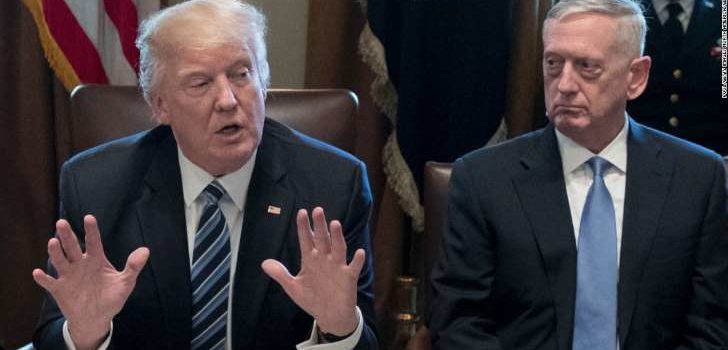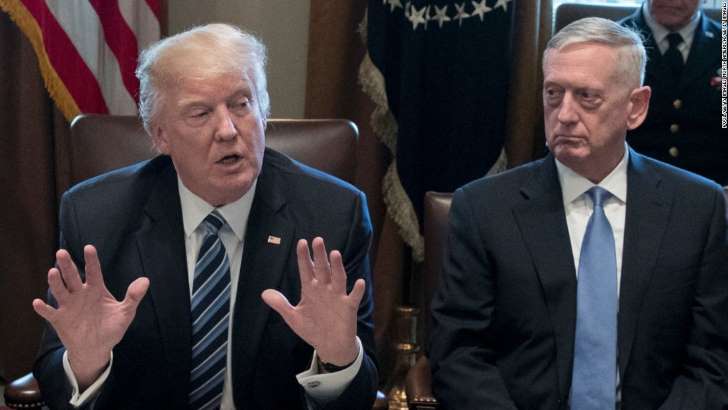Summary of the presentation to the NSF on…
Trump Administration National Security Issues –
The Players and their Playbooks
A Panel Discussion with
Tyrus W. Cobb, Keith Hansen, Rae Huffstutler
May 10, 2018
Esteemed NSF Members
“What’s going to happen when U.S. President Donald Trump and North Korean leader Kim Jong Un finally get together? I don’t know, and neither does anyone else. My colleague Graham Allison thinks there’s a limited but mutually beneficial agreement to be had; other analysts are decidedly more pessimistic.” (S.M. Walt, Foreign Policy, 25 April 2018)
Challenges in setting a course for national security and foreign policy face every new Administrations in their the first few years. The Trump Administration has faced many – some of their own making, some due to rapidly changing global events. How factors including seemingly constant change in key leadership positions and a President who tends to govern more via Twitter than through traditional policy making was the topic of a spirited discussion with NSF panelists Ty Cobb, Keith Hansen, and Rae Huffstutler.
Relying on his extensive experience both inside and outside of the National Security Council (NSC) over many Administrations, Ty opened the panel with an introduction to the key players on Trump’s National Security Team. As of a couple weeks ago, the rapidly revolving door seemed to have slowed down enough for us to be able to understand the new NSC leadership. The President and Vice President are joined on the NSC by the stalwart Secretary of Defense Jim Mattis, GEN USMC (ret), and the new Secretary of State (and former CIA Director) Mike Pompeo, the Secretary of Energy Rick Perry (another long-timer having been in the post since Jan 2017). In addition to these statutory members, NSC policy meetings typically include the Military Advisor and Chairman of the Joint Chiefs, GEN USMC Joseph Dunford and the Intelligence Advisor and Director of National Intelligence, Dan Coats.
Traditionally NSC deliberations are coordinated by a National Security Advisor (NSA) whose primary role is to facilitate open and candid discussions among its members. With the former Fox News commentator, neo-conservative, and policy-experienced John Bolton assuming the post in early April 2018 (the third NSA in 15 months), the tenor of NSC meetings has already changed. The role of keeping balance among disparate policy positions now appears to fall to the recently beleaguered Chief of Staff John Kelly. Fortunately, NSC policy-making is not rigidly defined by the short list above. Foreign policy positions are often voiced by UN Ambassador Nikki Haley. Economic issues, key to many national security debates especially now, come from Trump’s Key Economic Advisors (Secretaries of Treasury Steve Mnuchin and Commerce Wilbur Ross, Trade Advisor Robert Lighthizer, and Economic Advisor Peter Navarro). And border walls, immigration, and catastrophic event discussions require Homeland Security Secretary Kristen Nielsen to have a seat at the table.
So how do these players function under President’s neo-isolationist vision of America First? How do they deal with vexing global issues that are front and center including denuclearization of North Korea and Iran, trade wars (or not) with China, chaos, and war in the Middle East, and the looming issue of Russian interference in U.S. elections? To answer this Keith Hansen brought us a quick tour of the policy documents that traditionally underpin national security decision-making and Rae Huffstutler shed light on when the Trump Administration follows these policies…and when it does not.
Many of the national security issues including those involving Russia, Syria, North Korea, Iran, China, terrorism and extremism, trade with allies and trade tensions with rivals, immigration and regional conflicts, are not new in the Trump Administration. But how key decisions are made is, in some notable cases, very different. In the old days (i.e., every Administration since WWII) U.S. national security was largely based on key strategy documents such as the National Security Strategy, DoD’s National Defense Strategy & Nuclear Posture Review, State/AID’s Joint Strategic Plan, and DNI’s Worldwide Threat Assessment that were formulated by career agency professionals and guided by the strategic vision set by the White House.
Rae artfully refers to national security decisions that are in keeping with the traditional NSC roadmap as “policies carried by momentum.” The ongoing War on Terror (assuming this phrase still has meaning) and relations with Russia and Pakistan fall into this category. In contrast, Rae introduced us to “policies in play” in the Trump Administration. These are topics that have caught the personal attention of President Trump and, leaping over the carefully orchestrated policy processes of the NSC, are shared (often bombastically) on the President’s Twitter account. They may (or may not) be walked back later by cooler heads in the NSC or Congress. The Iran Nuclear deal has hopped onto the “policies in play” list along with North Korea, Syria, and China.
Breaking with tradition may have its benefits, but also poses many risks. For instance, no sooner had Trump agreed to a Summit with Kim Jung-Un of North Korea, by-passing a litany of long-standing carefully crafted under-the-radar negotiations, Kim used his world stage to stymie meeting preparations by canceling peace talks with South Korea and retracting his earlier statements about denuclearization. In another case, Trump’s recent leap into the fray regarding trade deals with softened sanctions against China by tweeting about saving jobs for Chinese workers in the company ZTE and sent U.S. trade negotiators and intelligence experts scurrying to keep American first, trade wars last, and secrets safe.
Deftly addressing timely questions our panel elaborated on these points even pointing out that one of the most obvious pitfalls to a fast and furious Summit with Kim, is the President himself, or at least his willingness to talk directly to a mercurial adversary. In a prescient reminder to us that the Iran nuclear deal is not a formal treaty ratified by Congress, but rather an Executive Agreement signed by President Obama along with the leaders of Iran, the United Kingdom, France, China, and Russia, our panel predicted (correctly) that President Trump would withdraw the United States from the multilateral agreement sending national security communities here and abroad scrambling to figure out what happens next.
Teeing up future timely topics for future NSF meetings, our panelists touched on two “momentum” issues, Turkey and Ukraine, that sit poised to be in play if Trump turns his attention to them in the future. Following the preference of the Trump Administration for bilateral talks rather than multilateral negotiations, Ty, Rae and Keith all agreed that large organizations such as the World Trade Organization and the United Nations play a critical and positive role on many key issues even though they can be unwieldy, cumbersome, pedantic and not entirely reflective of U.S. interests.
Touching on very emotional and public debate about the confirmation of Gina Haspel to lead the Central Intelligence Agency, the panelists and the moderator all voiced support for her long and accomplished career, while expressing reservations about the CIA’s past programs of enhanced interrogations (AKA torture) and rendition. They pointed out that her involvement in the post-9/11 politically–charged interrogation program was only one aspect of her qualifications that needed to be vetted to determine whether she was a good match for the position. Subsequently, Haspel was confirmed by the Senate on 17 May 2018 after expressing her position (verbally and in writing) that these programs were “wrong” and must not be repeated at the CIA under any circumstance.
May Haspel and all the other members of Trump’s national security team have the strength and wisdom to keep our country safe and secure through these tumultuous times.
COL Tyrus W. Cobb (PhD) served as Special Assistant to President Reagan for National Security Affairs from 1987-89 and Director of Soviet & West European Issues from 1983-87. In his 26-year Army career, he served in Viet-Nam (twice), Italy, Germany and in Washington, DC.
Keith Hansen has extensive experience in the defense and intelligence communities, having served as a US Navy officer for 30 years and as a National Intelligence Officer (NIO) for Strategic Programs and Nuclear Proliferation. He also supported and served on teams negotiating the SALT II, INF, START & CTBT accords.
Rae Huffstutler served as the Executive Director of the Central Intelligence Agency (CIA), the Director of Photo Interpretation, the National Photo Interpretation Center, and as the Director of Soviet & Military Research Analysis at the Agency.
The slides from the presentation and Rae Huffstutlers remarks can be found at these links.
Trump Administration National Security Issues slides
Rae National Security Policy Making



